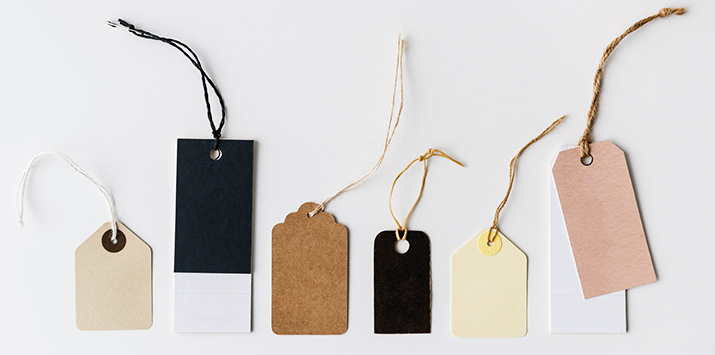Plastic bins can make for an efficient means of storage. Especially when you buy a number of them at the same time … all the same size and designed to nicely stack one on top of the other. I recently bought a lot of those bins. The containers have dark grey bottoms with bright yellow snap-on lids. You may have seen some of these at your local Costco or big box home improvement store.
I loaded and labeled each one of them. I knew their solid construction would protect the content packed inside and their stack-ability would make for an efficient use of space from floor to ceiling. And because they were all alike, I must say that our basement storage area looks better than ever.
It seemed like such a great idea … until the following week when I went down to retrieve an item from one of the bins.
Only to find the majority of my labels on the floor.
That is when their identical look went from an asset to a liability. Unstacking and opening several bins finally led me to the item I was looking for … and then sent me on the search for a better labeling option. After numerous failed attempts, I realized these bins had great stack-ability, yet little stick-ability! I was down, yet determined not to be defeated.
On a recent visit to our local office supply store, my eyes caught the word “Durable” on the packaging of some Avery 6793 labels … along with the picture of plastic bins on the front of the packaging. I decided to make one last attempt … and found victory. These labels have amazing stick-ability … and are such an asset on my storage bins!
Labels can also be a huge liability.
Especially when we apply them to people with Avery 6793 stick-ability. They can create a liability of not only generalizations, but also limitations. I was recently re-reading one of my favorite books, Awareness. It is a collection of stories told by the late Anthony DeMello throughout his years of giving retreats. Anthony nails the liability of labels:
“When you say of someone, ‘He’s a communist,’ understanding has stopped at that moment. You slapped a label on him. Or, ‘She’s a capitalist.’ Understanding has stopped at that moment. You slapped a label on her, and if the label carries undertones of approval or disapproval, so much the worse!” And then Anthony names the limitation: Because what you judge, you cannot understand.
Understanding stops.
And where understanding stops, limitations begin. It seems we go through a lot of labels, creating greater division and less understanding with most every label that sticks. Generations, occupations, race, country, religion, gender, preferences, and politics to name just a few.
Labels are concepts that fall short of understanding any one individual. And those same labels that we slap on others … and often slap on ourselves … can create blinders to the real content inside.
Anthony DeMello wonderfully continues in a later section of the book:
“All you’ve got is a label. You really don’t know the person (or yourself). The concept always misses or omits something extremely important, something precious that is only found in reality, which is concrete uniqueness. The great Krishnamurti put it so well when he said, ‘The day when you teach the child the name of the bird, the child will never see that bird again.’ How true! The first time the child sees that fluffy, alive, moving object, and you say to him, ‘Sparrow,’ then tomorrow when the child sees another fluffy moving object similar to it he says, ‘Oh, sparrows. I’ve seen sparrows. I’m bored by sparrows.’”
It’s hard to begin to imagine the cost we incur with the labels we apply. Division, by nature, leads us to something less. At the same time, the efficiency of categories somehow creates a deceitful sense of accomplishment and even success.
All the while, blinding us to what we are missing.
A couple of years ago, as my daughter and her fiancé prepared for marriage, they decided to read books on the opposite gender. The same author had written a separate book on each gender. What made it helpful (and avoided a lot of misunderstanding) was that they first read the book on their own gender. They made notations throughout the book where the author’s point of view rang true and also noted where the author’s generalized comments were not true of them at all. They then switched books and were able to read the book on the opposite gender with much greater understanding.
As I work to help executives dig for their core values, I am well aware of the risk of simply creating more labels at their core. It is precisely why naming our core values is just the first step in getting to truly know those values as we live them.
Labels can sometimes be helpful … as long as you can easily peel them off to discover the uniqueness behind them. Paradoxically, in rediscovering and appreciating the individuality inside … we are likely to find far more unity.
It makes me want to keep my durable Avery 6793 labels for the bins in my basement, where they accurately describe the contents inside … and let all the rest of life’s labels fall to the floor.
How about you? What labels could you peel off … in how you see yourself and in how you see others? And in rediscovering individuality, see a whole lot more clearly. Please share your thoughts below!


